891 Search Results for core vocabulary
July 16, 2018
by Carole Zangari -
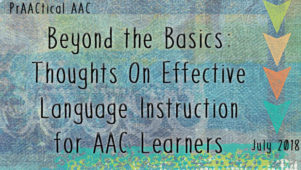
Have you worked with students like these? Gaby has been using SGDs since kindergarten. As she approaches high school, Gaby is able to express many things but her language is significantly below those of her peers. This makes it difficult for Gaby to read grade-level textbooks with comprehension, complete writing assignments, and perform well on academic tests. Ian’s SLP and teacher are trying to understand why he is able to learn new language skills but seems to lose some of them when they start working on new goal areas. When the time came for a speech-language re-evaluation, they were surprised that Ian scored so poorly in areas where he made mastered his IEP goals. Brandon is a fifth grader who wants to go to college someday. His language skills have been growing steadily since he got his first AAC device several years ago, but are still remarkably delayed. In situations... [Read More...]
June 28, 2018
by Carole Zangari -
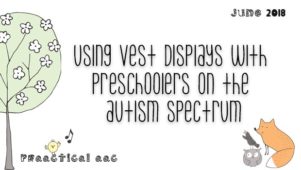
We’re so pleased to welcome back Dr. Carol Goossens’, an AAC pioneer who is an internationally-recognized consultant, SLP, and Special Educator from New York. Throughout her career, she has consulted extensively in a variety of classrooms serving the full spectrum of children with special needs. Dr. Goossens’ has presented both nationally and internationally about her collaborative work with teachers, therapists, and families. In today’s post, she shares a treasure trove of ideas on using wearable AAC. Learn more about her approach to using vest displays in this extensive post. :::::::::::::::::::::::::::::::::::::::::::::::::::::::::::::::::: Using Vest Displays with Preschoolers on the Autism Spectrum When working with students on the spectrum, we often struggle to gain and maintain their attention, especially during group activities such as Circle Time/Morning Meeting. The songs offered during Circle Time, however, create a great forum for working on a variety of communication skills, e.g., claiming a turn, announcing a song, choosing... [Read More...]
May 10, 2018
by Carole Zangari -
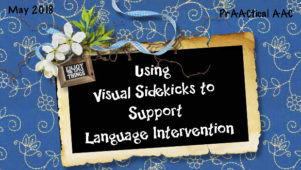
SLPs Lori Sanzeri and Chelsea Collins, creators of Core City, are back to share ideas for implementing AAC in the classroom. Today, they share their experiences in using visual supports as a supplemental strategy for their students who are beginning to use AAC. Enjoy! ::::::::::::::::::::::::::::::::::::::::::::::::::::::::::::::::::: Using Visual Sidekicks to Support Language Intervention Have you ever tried to read a book to your students without providing any visual supports? Do you find yourself having difficulty thinking about what questions to ask? Do you ever feel like the story is too “wordy” or difficult for your students to understand? Have no fear, Visual Sidekicks are here! Visual Sidekicks provide a color-coded communication board of target core and fringe vocabulary along with sentences of 3-5 symbols that simplify the text throughout the story. Children with special needs often demonstrate difficulties during structured literacy activities in the following areas: attending to... [Read More...]
March 12, 2018
by Carole Zangari -
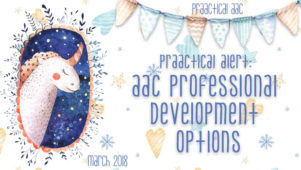
Lauren Enders, an amazing AAC SLP from Pennsylvania, graciously shared this list of professional development opportunities that may be of interest. Lauren works as an Augmentative Communication/Assistive Technology Consultant for Bucks County Intermediate Unit #22. In the list below, she shares resources for AAC learning in both online and face-to-face formats. Enjoy! You can see more of Lauren’s guest posts here. PROFESSIONAL DEVELOPMENT OPTIONS FOR AAC IMPLEMENTATION ONLINE SELF-DIRECTED LEARNING OPTIONS: Power AAC modules: a FREE training series developed by The Pennsylvania Training and Technical Assistance Network (PaTTAN)with Gail Van Tatenhove, CCC-SLP. This series of brief modules can be used for professional development by individuals or groups who are supporting students with complex communication needs and who need or use AAC. The POWER AAC modules are intended to build the capacity of school personnel to improve communication skills and provide flexible, generative vocabulary for students who need or use AAC. AAC Institute... [Read More...]
March 8, 2018
by Carole Zangari -
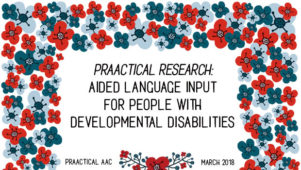
We’re pleased to welcome back Dr. Kathy Howery for another analysis of an AAC research article. Kathy is based in Alberta, Canada, and has worked in the field of AT and special education for over three decades. In the past year, she completed her doctoral studies where she used phenomenological methods to seek to understand the lived experience of speaking with/through a speech generating device. Kathy is currently working as a consultant to schools and school districts across Alberta focusing primarily on children and youth with complex communication needs. ::::::::::::::::::::::::::::::::::::::::::::::::::::::; Allen, A. A., Schlosser, R. W., Brock, K. L., & Shane, H. C. (2017). The effectiveness of aided augmented input techniques for persons with developmental disabilities: A systematic review. Augmentative and Alternative Communication, 33, 149-159. What this Article is All About (The Focus of the Research) This article presents the results of a systematic review of the research into what the authors refer... [Read More...]
January 22, 2018
by Carole Zangari -
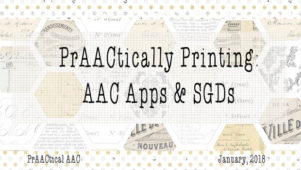
Whether you are working with a traditional SGD or an AAC app, chances are, you want to print a ‘no tech’ version for modeling and/or as a backup communication aid. We’ve shared printable communication boards and books on many previous occasions but here are links to some of the ones that are requested most frequently. Proloquo2Go Crescendo (English, Spanish, French, & Dutch) Snap + Core First (multiple sizes/layouts) and editable copies via Boardmaker Online LAMP Words for Life WordPower (many versions: regular and poster; some Spanish) Unity (with free PASS software) Speak for Yourself Core Samples Do you print and use other manual communication boards or posters? We’d love to hear about that.
January 11, 2018
by Carole Zangari -
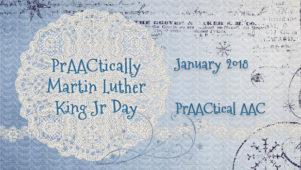
Looking for activities and books to help integrate AAC and language learning with content about Dr. Martin Luther King, Jr? Here are some resources to explore. Acts of Kindness and Justice Martin Luther King Jr: Venn Diagram: Great for practice of core and fringe vocabulary, as well as information-giving (e.g., name, birthday) and comparing/contrasting Martin Luther King Jr I Have a Dream Speech: Wonderful for older learners and those focused on Tier 2 vocabulary, more complex sentences, main idea, narrative development, and inferencing. Martin Luther King Jr Holiday 5 Resources for AAC Learners Visual Supports, Core Words, and Martin Luther King Core Values: Suggestions for Language Building with AAC Learners
October 12, 2017
by Carole Zangari -
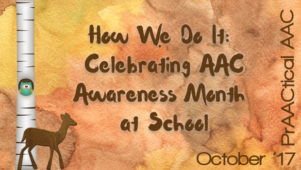
What better way to start the day than to see how AAC Awareness Month is being celebrated in a school system?! Today, pediatric SLP Elisa Parker tells us how they do it in the school district where she works. For the past 20 years, Elisa has served young children in the Park Hill School District in Kansas City, Missouri. Her passion for AAC and children with autism led to her becoming an Autism Coach and Assistive Technology Facilitator. She has been an Autism Coach for the Gerner Family Early Education Center for 7 years and the Assistive Technology Facilitator for 3 years. Elisa consults with and provides AAC training for teachers and support staff of young students who use AAC and has also coached teams at the K-12 level. ============================ Celebrating October – AAC Awareness Month There are so many hardworking staff members I work with who implement AAC in their classrooms... [Read More...]
October 2, 2017
by Carole Zangari -
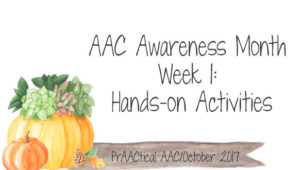
Welcome to ISAAC‘s 10th Annual International AAC Awareness Month! For the past decade, October has given us some extra opportunities to spread the word about all things AAC, and it’s pretty exciting to think back on all we’ve done and also to plan for the current year. Each week during AAC Awareness Month we’ll share suggestions for things to do to help others learn about a field that emerged to support children and adults with complex communication needs. This week, we’ll focus on hands-on activities. A popular approach to AAC Awareness Month is to invite a group of colleagues or families to come together and communicate only through AAC for the event. Some years, we’ve held ‘Silent Snack’ events before class where we put out a variety of board games and invited some of our AAC clients to come in and play along. They enjoyed serving as our AAC Ambassadors,... [Read More...]
April 2, 2017
by Carole Zangari -
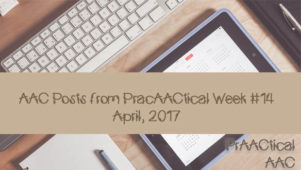
The start of April is always a busy time. We launched Autism Awareness and Acceptance Month by learning more about how to differentiate instruction in ways that let kids with autism and other communication challenges grow and shine. Thanks, Phyl Macomber and UM-NSU CARD for a great day of learning and connecting! Hope your start to the month was equally enriching. Monday: PrAACtically April: AAC Resources for A Year of Core Words Tuesday: PrAACtical Alert: AAC App News (Throughout the month, we’ll keep updating this with news of AAC app discounts and other sales on autism-related materials). Wednesday: PrAACtically April: AAC Resources for A Year of Core Words Thursday: 30 Ways to Support Autism Awareness & Acceptance Month









